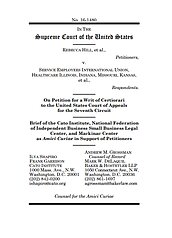Learn more about Cato’s Amicus Briefs Program.
Illinois mandates that Rebecca Hill and thousands of other home-based Medicaid and daycare workers accept an advocacy organization—in this case, a local division of the Service Employees International Union (SEIU)—as their exclusive representative in collective bargaining negotiations with the state. These workers, however, do not work for the state. Indeed, the state does not direct their work, nor do they receive state health insurance, pensions, or any other benefit that would normally come with working for a state government. The only connection these workers have with the state is that it indirectly pays part of their wage from federal Medicaid funds. Yet Illinois designates them as “state employees” for collective bargaining purposes. This in turn allows the SEIU to speak and lobby on the workers behalf. But there is a major problem with this scheme: many of these workers do not want the union to represent them, nor do they want to be associated with the union’s views.
Fortunately, home-based workers of this kind no longer have to pay for these forced associations. The Supreme Court held in Harris v. Quinn (2014) that collecting a fee for a union’s collective bargaining activity from home-based workers who do not want to join a union is an unconstitutional infringement of their First Amendment rights because such workers are not “full-fledged public employees.” But, unfortunately, Harris did not resolve a more basic and fundamental issue: whether a state government can even force non-full-fledged public employees—or employees that have no relationship to the state at all for that matter—into unwanted associations in the first place. This case deals with that unresolved question. Hill and several other plaintiffs sued Illinois and the SEIU, claiming that forcing them into an exclusive representative relationship with the union violates their First Amendment right not to associate. A federal district court— citing Abood v. Detroit Board of Education (1977) and Minnesota State Board for Community Colleges v. Knight (1984)—dismissed the claim, and the U.S. Court of Appeals for the Seventh Circuit upheld that ruling. The Seventh Circuit reasoned that those cases only required Illinois to provide a “rational basis” for forcing workers to associate with the SEIU, not the heightened scrutiny that is typically required when government infringes on a person’s First Amendment associational rights.
Cato, joined by the National Federation of Independent Business and Michigan’s Mackinac Center, is supporting Ms. Hill and the other petitioners asking the Supreme Court to hear the case. We argue that the Seventh Circuit interpreted Abood and Knight far beyond their holdings and logic. Both of those cases dealt with true public employees, not with workers designated as public employees merely for collective bargaining purposes. The Supreme Court made it clear in Harris that Abood and its progeny do not apply to cases involving non-full-fledged public employees. Moreover, if this ruling stands, what is to stop Illinois—or other states with similar laws—from designating any workers that directly or indirectly take some state funding as a public employees? This might include nurses or doctors who take Medicaid, attorneys representing the indigent in state courts, foster parents, or employees of businesses receiving state funds. Where does it stop? Indeed, other states are already doing this in a number of jurisdictions—including in the First and Second Circuits—which have recently upheld similar laws that Cato earlier urged the Supreme Court to hear. The Supreme Court should take this case and reaffirm that the First Amendment protects workers against being compelled to associate with groups they do not want to join.
